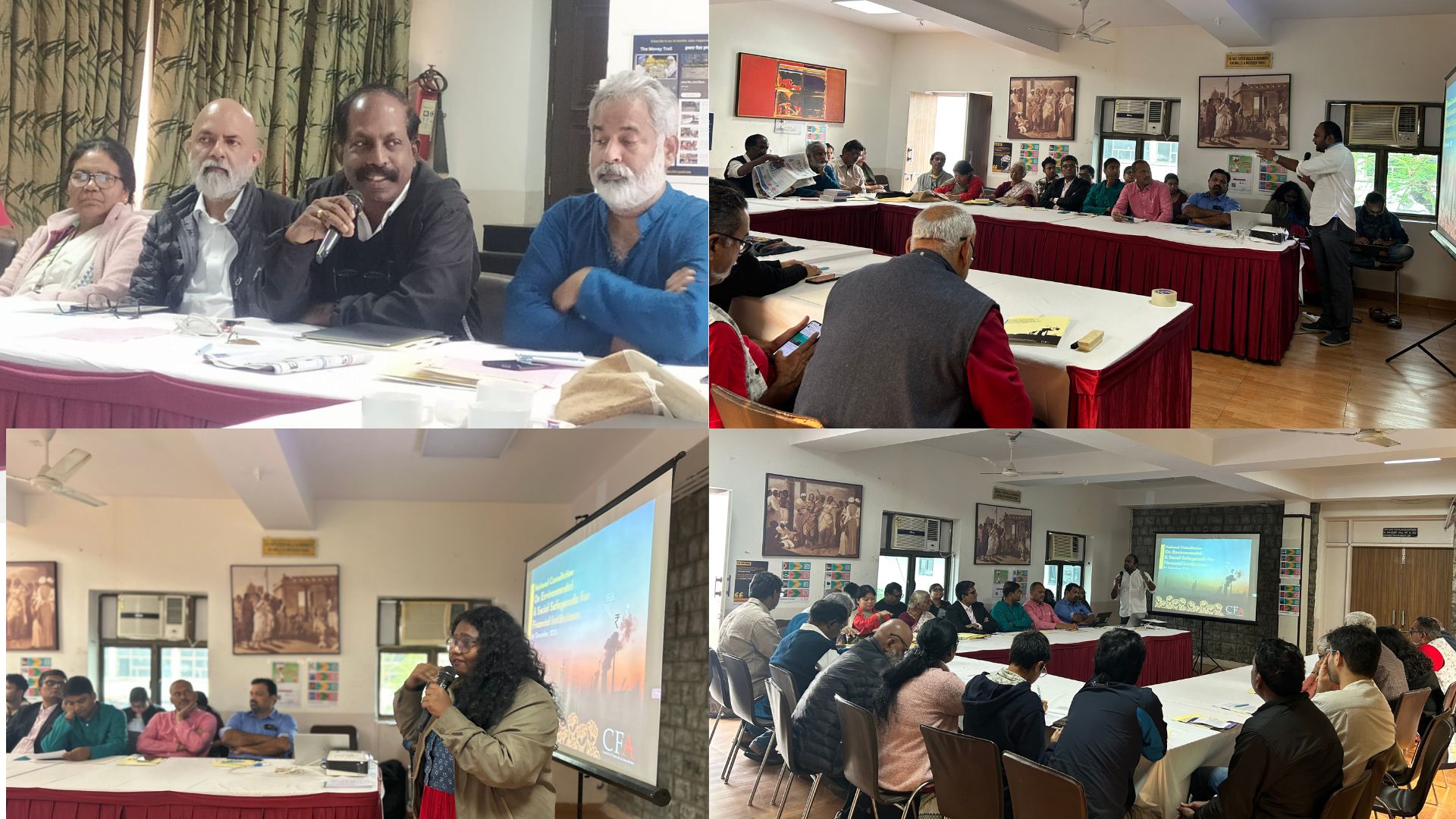PRESS RELEASE: 03-12-2023
New Delhi: “For years the people of Teesta valley had been campaigning against the dam, we repeatedly warned them about the possible disaster, but we were targeted and ignored. And now the dam has been washed away.” These were the words of Mayalmit Lepcha, an activist from Sikkim in a Consultation meeting just a couple of months after the foretold disaster of Sikkim where the dam financed by several public sector banks was washed away causing death and destruction. The consultation aimed to bring the focus on project financing that harms both environment and communities.
While disasters and protests against projects such as dams, ports, and expressways, made headlines, the financial institutions, especially Indian banks, funding them largely escaped public attention. The January protests against the NTPC hydropower project in Tapovan-Vishnugad after the Joshimath submergence, and the October collapse of the Teesta Stage 3 dam due to a glacial lake outburst flood, highlight the potential for environmental and social harm caused by infrastructure projects. Despite these warnings, banks and financial institutions continue to finance these projects, raising questions about their due diligence and commitment to sustainability.
Renowned Activist Medha Patkar from Narmada Bachao Andolan emphasised, “Environmental and social accountability mechanisms are required not just in banks but in all bodies providing funds to mega projects.”
Dayamani Barla, tribal rights activist and journalist said, “Multiple laws have been passed in recent years to aid displacement of locals and extortion of land. Despite the fact that the 5th schedule is supposed to protect nadi, nala, khet. The skyline has changed, thick forests have large concrete buildings inside of them. All the hydropower projects built on rapids do not send water to farms or electricity to villages.”
Bharatbhai Patel of Machhimar Adhikar Sangharsh Samiti, drew upon his experience of upholding fishworkers rights in the context of the port project at Mundra, Gujarat. He said, “The lack of accountability mechanisms at Indian banks and financial institutions makes it difficult to raise concerns with them arising out of the devastating social consequences of the projects they finance.”
The ‘National Consultation on Environmental and Social Safeguards for Financial Institutions’ organised by Centre for Financial Accountability at YMCA New Delhi on December 1, 2023, brought together activists, researchers, non profit organisations, and civil society members.
Mayalmit Lepcha from Affected Citizens of Teesta shared the experience and struggles of Teesta Dam 3 collapse, which took place on October 4, and affected the community. A long time activist working on the impacts and unsustainability of large projects in eastern Himalayas said, “We need to include local perspectives in impact assessment of projects through local research. Researchers coming from outside are not sensitive to socio-religious & cultural concerns of the people.” Lepcha emphasised the need to draw upon the knowledge of community elders.
Sagar Asapur, Head of Sustainable Finance at Climate Risk Horizons said “Banks should have clear policy commitment and exclusion/screening list for activities that will not be financed. Activities leading to deforestation, biodiversity loss, human rights violation, weapons and munitions and fossil fuels deserve greater scrutiny and exclusion.”
Priya Dharshini, National Coordinator of Delhi Forum, drew attention to the eroding rights of the marginalised. “The natural resource based communities are facing the triple whammy of climate change induced disasters, development projects and now even the so called mitigatory and adaptive measures which destroy their ways of life and livelihoods.”
Joe Athialy of Centre for Financial Accountability said that, “Safeguards and Accountability mechanisms can be another tool in the hands of communities and people to protect their rights and environment and to hold institutions accountable for their investment in high impact projects.”
The consultation highlighted that as the climate emergency worsens, the government and financial institutions need to respond concretely to the crisis. Despite lending for high ecological and human impact development projects, Indian banks have not felt the responsibility to formulate a safeguards policy. As a result of international agreements and domestic regulations, many Indian banks have now adopted environmental and social policies under the Environment Social and Governance (ESG) framework in the credit appraisal process. But such policies are not mandatorily implemented. Lack of transparency makes it unclear if ESG is implemented by the banks in actual practice. Mere reporting and setting credit appraisal criteria is not enough. There is hardly any mechanism to hold them accountable in case of violations, without which safeguard policies are toothless. Project related disclosures are needed and we need cumulative impact assessment of projects on a particular ecology and people. For environmental and social impacts threshold technical criteria need to be defined. In addition, banks and financial institutions need to put in place a grievance redressal mechanism.
The consultation resolved to reach out to experts, community representatives and researchers so as to develop a policy draft through wider consultation guided by an Advisory Committee that was nominated in the meeting.

